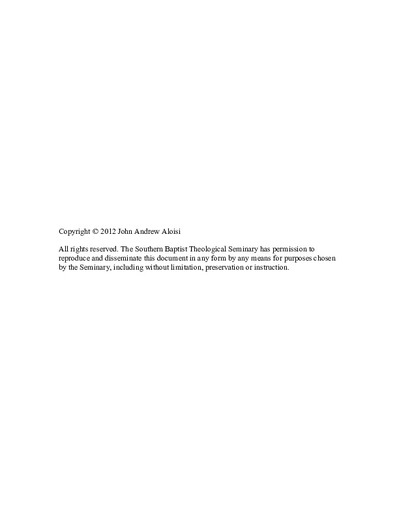| dc.contributor.advisor | Nettles, Thomas J. | |
| dc.contributor.author | Aloisi, John | |
| dc.date.accessioned | 2012-12-14T19:53:30Z | |
| dc.date.available | 2012-12-14T19:53:30Z | |
| dc.date.issued | 2012-12-14 | |
| dc.identifier.uri | http://hdl.handle.net/10392/4106 | |
| dc.description.abstract | This dissertation examines the role of ethical monism in the theology of Augustus Hopkins Strong. Chapter 1 discusses some of the reasons for examining Strong's theology and some of the difficulties entailed in such a study.
Chapter 2 surveys the life of Strong up until the time when he returned to Rochester Theological Seminary and assumed the dual role of president and professor of theology in 1872. Special attention is given to factors which affected or pointed toward his later decision to embrace ethical monism.
Chapter 3 explores the writings of several German thinkers who seem to have provided some of the philosophical building blocks which Strong used to construct his ethical monism. It also examines the writings of several English-speaking philosophers who emphasized the doctrine of divine immanence and who appear to have pushed Strong's thinking toward ethical monism.
Chapter 4 discusses the various stages in Strong's decision to adopt ethical monism. It also traces his early incorporation of ethical monism into his larger theological system.
Chapter 5 examines the impact which ethical monism had on other areas of Strong's theology. In particular, it discusses how ethical monism affected Strong's view of Scripture and experience, evolution and miracles, and sin and the atonement.
Chapter 6 explores how other theologians viewed Strong's final theology and how Strong's theological journey affected the institution and people whom he impacted most. It argues that neither Rochester Theological Seminary nor the integrity of his theological system remained unaffected by his decision to embrace ethical monism. It also notes that both theological liberals and theological conservatives were generally critical of Strong's ethical monism, though for different reasons.
This work contends that ethical monism was a means by which Strong attempted to reconcile Christian theology and modern thought while also trying to solve tensions within his own theology. In the end, Strong was unable to persuade modernists to embrace ethical monism or to convince conservatives that ethical monism was a legitimate theological option. Strong's attempt at a theological synthesis failed due largely to the contradictions which ethical monism produced within both Christian theology and philosophical monism. | en_US |
| dc.subject.lcsh | Strong, Augustus Hopkins, 1836-1921 | en-us |
| dc.subject.lcsh | Monism | en-us |
| dc.subject.lcsh | Theology | en-us |
| dc.subject.lcsh | Immanence of God | en-us |
| dc.title | Augustus Hopkins Strong and Ethical Monism as a Means of Reconciling Christian Theology and Modern Thought | en_US |
| dc.type | Electronic dissertation | en_US |
| dc.type | Text | en_US |
| dc.publisher.institution | Southern Baptist Theological Seminary | en_US |

